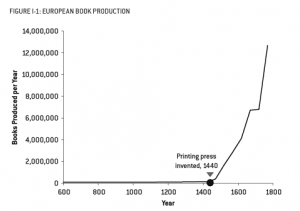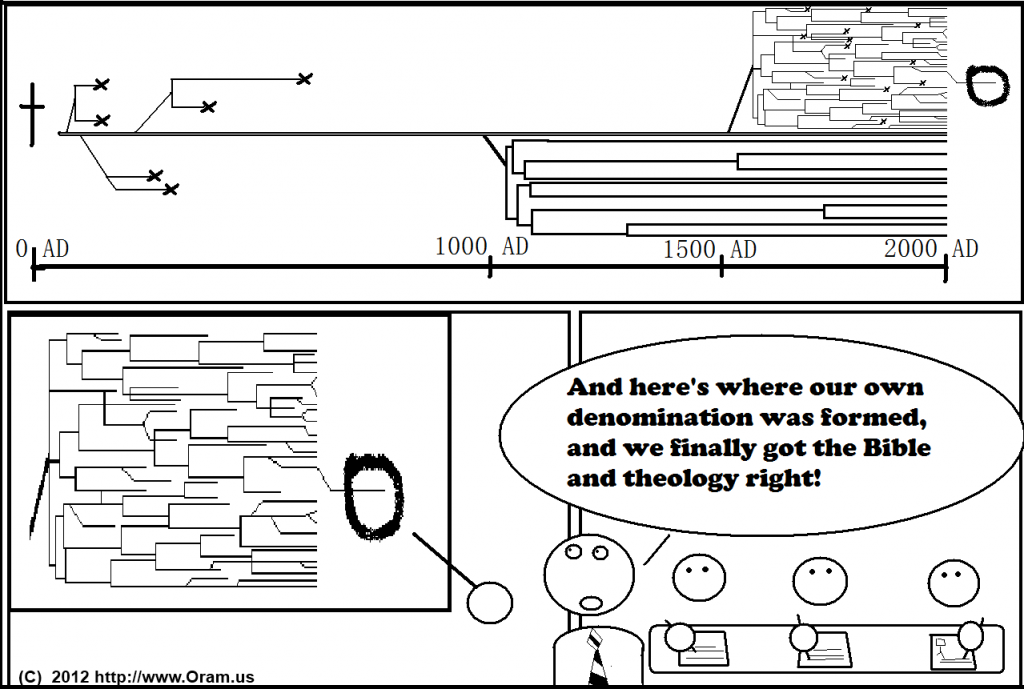 At the end of the 15th century, mankind was hit with an invention that did more to shape culture, life and education over the next 500 years than any advancement prior, and arguably more than all other advancements combined. The printing press made the dissemination of information quick and easy, and relatively cheap. Book after book, manual after manual, pamphlet after pamphlet; all could be reproduced quickly and easily. Astounding stuff. Never before had so many people had such access to such information, all able to read it and weigh in on it. Never before had so many opinions flown so quickly.
At the end of the 15th century, mankind was hit with an invention that did more to shape culture, life and education over the next 500 years than any advancement prior, and arguably more than all other advancements combined. The printing press made the dissemination of information quick and easy, and relatively cheap. Book after book, manual after manual, pamphlet after pamphlet; all could be reproduced quickly and easily. Astounding stuff. Never before had so many people had such access to such information, all able to read it and weigh in on it. Never before had so many opinions flown so quickly.
On some matters, this made rapid advancement through shared knowledge a real possibility. The medical arts, natural science and technology took off like never before, riding the wake of this potent weapon of knowledge. Few if any would deny this was a good thing.
However, on certain matters – religion and philosophy – it is debatable as to whether or not a superfluity of opinion is a good thing; especially uninformed opinion. Let me first couch what I am saying by prefacing that that I am, in fact, using the internet, which is for all intents and purposes Gutenberg’s press on speed, crack, coke, meth, and caffeine all at the same time; I realize that I am in part knocking the very medium which is bringing my words to your brain. So be it. And I even admit that I am about to (and have already) dispense with some opinion which some might view as uninformed. Yet the very experience of most people who’ve ever partaken in an internet forum debate or scanned briefly through Youtube comments will serve as evidence of the danger of a glut of uninformed opinion. Certainly, people can be very dumb when they think they know what they are talking about.
Now, take Christianity, which had been excelling through it’s high point from the 12th century right up into the 14th and 15th centuries – far contrary to the common “dark ages” view given often in outdated historical texts shaded with “enlightenment” bias greatly unfounded. Sure, there were rogue heretics here and there, a few scandalous popes or bishops every now and again — which can hardely be unexpected in a church founded upon a bunch of cowards who fled their crucified master, and the first pope who denied him thrice in public. Yet Christendom was One…well, two if you count the Orthodox split (I’ll save that for another post). But all Christians agreed on nearly everything but the supremacy of the bishop of Rome (it’s interesting to note, also, that the one thing that all non-Catholics hold in common is the denial of the supremacy of the bishop of Rome). Ask a member of the clergy what baptism is, or what apostolic succession is, or how we know what books are in the bible, if the Son is consubstantial with the Father, or if the Eucharist is merely symbolic, and they’d give you the same answer, for both were heirs to a common tradition laid by the Apostles and Early Church Fathers of the first few centuries.
So, when the scriptures began to circulate (Gutenberg’s first book was, of course, the Bible), there was initially rejoicing at the wealth and treasure given to all . . . until everyone decided to weigh in on this matter. A flurry of opinions and ideas began to circulate, and quickly got out of hand, without a system of checks and balances in place to answer questions and field objections raised. It did not help that in the background we did have a number of higher-up clergy who were or had abused their authority (e.g., the purported scandal of the abuse of indulgences) set tensions on edge. People saw corruption and sought an antidote to the corruptions they perceived to be stemming from rotten traditions.
Many thought they found the antidote in Sola Scriptura.
Chesterton once aptly wrote, “The reformer is always right about what is wrong. He is generally wrong about what is right.”
The Divine Signal and the Noise of Interpretation
Nate Silver wrote a book, The Signal and the Noise, which took a look at the massive rise in information just in the last 50 years. He wrote the book to explain, as the subtitle professes, why so many predictions fail, but others don’t. It was in part an attempt to explain a statistical approach to prediction that had allowed him to correctly predict the entire 2008 election outcomes other than one senatorial race. In the introduction, he tackles the beginnings of the glut of information, saying of Gutenberg’s press:
The most enthusiastic early customers of the printing press were those who used it to evangelize. Martin Luther’s Ninty-five Theses were not that radical; similar sentiments had been debated many times over What was revolutionary as Elizabeth Eisenstein writes, is that Luther’s theses “did not stay tacked to the church door.” Instead, they were reproduced at least three hundred thousand times by Gutenberg’s Printing press—a runaway hit even by modern standards.
The schism that Luther’s Protestant Reformation produced soon plunged Europe into war…
Rampant opinion fought against rampant opinion, and the sheer volume of literature became unfathomable very quickly, as pedant and simpleton alike engaged in a mass war of pamphlets and books which flooded the marketplace of ideas beyond it market’s capacity to handle, sift, sort, engage, and reply.
In the process, many things became taken for granted as proven which were, in fact, anything but.
Killing the Fairy Tale
Once upon a time, in the world that was Christendom, you could trust that you and your neighbor were on the same page, more or less, theologically and philosophically. But with the rise of personal interpretation, everyone became their own pope.
See, Sola Scriptura is a funny beast. It is the razor that is meant to trim away wayward traditions. It means that above all things, the scriptures alone are the source of Christian information. It flew in the face of orthodox, catholic beliefs, and this was lauded by many as a good thing.
However, in the haste and excitement, everyone forgot to ask if Sola Scriptura could meet its own demands, or whether it was liable to undermine itself (or worse). It was to be the hallmark of modern Christian thinking in more than one way. For it was, of course, the paradigm that even to this day guides the Protestant denominations. But it was an utterly divisive tool, because the scriptures were never meant to be a stand-alone set of texts.
If in fact the doctrine of Sola Scriptura is true, we ought to expect that we could find it spelled out in scripture – but we cannot. We can find wholesale endorsements of scripture (like 2 Tim 3:15), but none ever suggest that it alone is all we need or is sufficient. St. Paul demands adherence both to traditions written down and passed on orally through the Church (2 Thess. 2:15), and not scripture but the Church he calls “the pillar and foundation of the truth” (1 Tim 3:15).
The Nostrum of Sola Scriptura
Logically, if the bible alone is to be the rule we accept, ought this rule to come from the bible? Sure. And can it be found within the pages of scripture? No.
But the problem runs deeper than that, for when taken as the axiom, the assertion of sola sciptura undermines the very foundation of the Bible. For, consider this fact: If the Bible alone is the rule, then shouldn’t the Bible alone tell us what books belong in the Bible?
How do we know that Matthew or Mark or Luke or John or Peter or any of Paul’s letters are to be accepted? Can we back this up “biblically”? The answer is: No. We cannot. It was an act of the Church (read: a group of men who claimed to be bishops in the church, who professed a belief in apostolic succession and other “abhorrent” doctrines) who took it upon themselves in the 4th century to settle precisely what books belong in scripture – and it is that ruling, infallible or else fallible that allows one to use the scriptures with any confidence.
If we knew that the scriptures were inspired by God (by definition), but didn’t know which ones were inspired, then a Bible would do us little more good than, say, the writings of St. Augustine: they’d be good spiritual reading, perhaps, but also perhaps containing dangerous errors. For certainly, we might be missing key books; but worse yet, we might have unwittingly accepted false books and false teachings.
Thus by this simple test we can know that Sola Scriptura is a false doctrine; logically it must be so. Ironically it is a tradition of men, introduced 500 years ago, which is killing Christianity. Few stopped to question this unmitigated good, and just accepted it wholesale. It has become ingrained in protestant mentality, that all one needs to do is appeal to the scriptures themselves and one can know the truth – yet when your truth and my truths conflict, we have no higher arbiter than ourselves and our own interpretations. When this happens, we split ways, and start new denominations. Thus 3 or 4 main fissures at the beginning of the 16th century have devolved, factioned and shattered into over what some have estimated as 30,000 different denominations (and even merely 3,000 would be too many), each teaching different doctrines as the truth, and all claiming to be led by the spirit.
It is this image which the world finds utterly ridiculous, and so writes off Christianity wholesale as a botch. Yet the faith is not a botch – far from it. It is merely the fruit of this quackery masquerading as an antidote.
And from this, a massive division between Catholic and Protestant arose, perpetuated by wars and strife, until educated men got sick of the whole endeavor, and chucked both in a move for “enlightenment”, which has devolved into today’s common division between religion and all other aspects of life, and a general darkening of the intellect. Assumptions were made that would preclude the supernatural, and the logic worked from there, and enough similar opinions flourished that they felt justified. And today we are post-post-modernists, devoid of any sense of objective truth, and worse of any way of seeking it, given the assumptions we bought wholesale from prior generations; we have secular, atheistic “rationalists” who, when pressed, deny the very fact of reason or truth.
All this from a medium which rapidly sped up the ability of humans to communicate.
No wonder most children today entering high school and college think in chat-speak.

